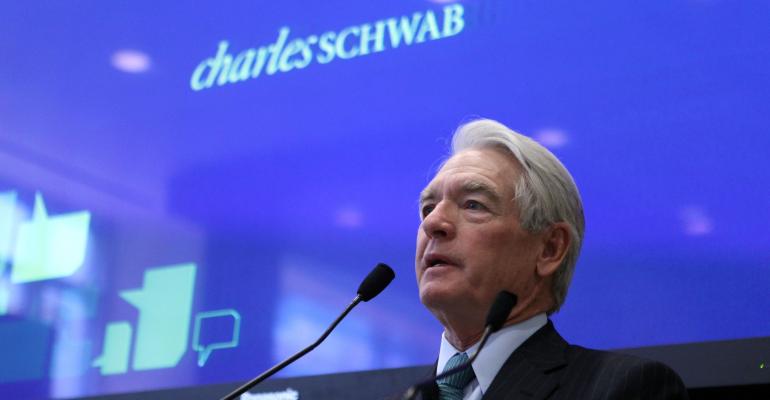For financial advisors, one of the trickier requirements of the job has been helping clients decide the optimal strategy around divestment of assets in retirement. A thorny mix of questions arise: determining if clients have enough money set aside to retire, how and whether they can afford to leave a trust, what is the most tax-efficient manner of doing all that—and even helping a client gauge his or her life expectancy. It's a challenging process for clients. It's a value-add for advisors.
On the retail side of its business, though, Charles Schwab has quietly been building an automated solution to handle many of these retirement-planning puzzles.
Following comments made at the Schwab IMPACT conference, where executives described “evolving thinking,” Charles Schwab announced that it was launching an income-focused version of its robo advisor platform. Called Schwab Intelligent Income, the tool is designed for retail clients and puts the firm in competition with several far smaller, more recent entrants to wealth management, which includes retirement-focused robo advisors United Income (acquired by Capital One in July) and Kindur, a startup launched in April, as well as retirement-focused features offered at firms like Personal Capital. Schwab's entrance into the fray adds clout to the argument that decumulation is the next frontier for automated investment management.
Schwab’s product is designed to provide investors with “a simple, modern way to pay themselves in retirement, or any other time, from their investment portfolios.” Expected to launch next month, the service will be built on Schwab Intelligent Portfolios and will “project, manage and automate multiple retirement income streams.” It will also build on the Schwab Intelligent Portfolios Premium offering, which gives users access to remotelylocated CFPs for a one-time fee of $300 plus a $30 monthly subscription.
The feature will be tax-aware and use withdrawal strategies across taxable, IRA and Roth IRA accounts, factoring in RMDs, tax-loss harvesting, dividends, portfolio rebalancing and income. It aims to give investors a predictable monthly income and Schwab is providing around-the-clock live support. The income generated is automatically transferred to users’ Schwab or external bank account.
Schwab’s move lends credence to the strategies of Kindur and United Income. For its part, United Income said it now had over $1 billion in assets under management, double what it had a year ago. Its most recent regulatory filings, however, still list the firm’s AUM at $844 million. United Income is expanding both its software and service teams under its new ownership, according to a letter from Matt Fellowes, head of the firm, that was sent to account holders.
Indeed, its new banking umbrella has served the firm well, said David Goldstone, research analyst at Backend Benchmarking. “United Income was one of the first digital advice providers to launch a retirement paycheck feature. [It] also built [its] platform with tax location strategies from day one, which I believe was ahead of the curve for modern digital advice tools,” he said. “The acquisition of United Income by Capital One creates the opportunity for clients to be cross-sold onto the United Income platform.”
“Banks and brokerages who have launched digital advice have found most of their success by onboarding clients with existing relationships,” he added. Needless to say, Schwab has both a bank and brokerage.
Kindur launched a subscription service, called SmartDraw, this fall that provides users with drawdown guidance without enrolling in asset management. Under the asset management side of its business, it implemented a no-commission fixed annuity, something that accumulation-focused automated investing platforms would have little reason to include. For its part, SmartDraw is an expansion of services for Kindur, which counts $25 million in AUM per its most recent regulatory filings.
Schwab’s move shows that automation will continue to be a force affecting both advisors and other algorithmic-style investing platforms, said Goldstone. “Schwab has been continually investing in Intelligent Portfolios,” he noted. “Tools to help users tackle drawing down assets in retirement are a logical next step.”
Robos with more advanced decumulation features should give pause to complacent human advisors, he added. “As digital advice platforms increase in complexity and sophistication, traditional advisors need to be prepared to defend their value propositions and focus on the quality and breadth of their services,” he said. “Traditional advisors face-off against digital products at every turn.”
While Schwab is raising the stakes for automated decumulators, the only advisors who will have access to Schwab Intelligent Income—for now—are the remote CFPs working with Schwab Intelligent Portfolios Premium. “There are no plans at the moment” to expand the service to outside advisors, said Marianne Ahlmann, a company spokesperson. “But we are always evaluating how we can leverage existing solutions and technologies to better serve clients across different areas of the firm.”





